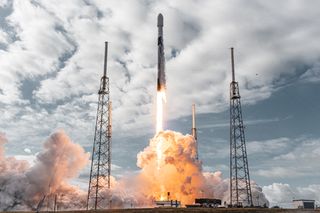
Planet has signed another contract with SpaceX, locking it in as the 'go-to launch provider' for the Earth-imaging company through 2025.
San Francisco-based Planet operates the world's largest fleet of Earth-observation satellites, most of which are tiny but capable cubesats known as Doves (or, more recently, SuperDoves). SpaceX Falcon 9 rockets have launched 83 Planet satellites on seven missions to date, and the new deal ensures that number will grow.
"I'm excited to continue our partnership with SpaceX," Planet co-founder and CEO Will Marshall said in a statement today (Aug. 5). "We've had seven launches to date. But more than that, together we've pioneered rapid planning, manufacturing and launch of satellites that only Planet and SpaceX could together have achieved."
Related: Planet satellites' views of Earth (photos)
Today's statement doesn't specify the number of planned launches or the value of the contract. It describes the deal as a "multi-year, multi-launch agreement with SpaceX, solidifying them as our go-to-launch provider through the end of 2025."
Planet spacecraft will piggyback as "rideshare" payloads on Falcon 9 rockets, as they have done in the past. The first planned launch under the new agreement is scheduled for this December, when 44 SuperDoves will lift off on SpaceX's Transporter-3 mission.
Planet satellites have launched atop a number of rockets to date, including India's Polar Satellite Launch Vehicle and Rocket Lab's Electron (which gives small satellites dedicated rides to space). Planet will maintain such diversity in the future despite the new SpaceX deal, company representatives said.
Get the Space.com Newsletter
Breaking space news, the latest updates on rocket launches, skywatching events and more!
"Moving forward, we will continue to operate with a variety of launch providers to ensure that launch needs can still be met in the event of unavailabilities of specific providers," Planet representatives wrote in the same statement. "By engaging with a diversified manifest, Planet can find launches to the right orbit in the right time frame for each evolving satellite project."
For example, Planet recently signed a deal with Bay Area startup Astra for a "multilaunch mission" in 2022. Astra has not yet launched any satellites to orbit but will attempt to do so on a mission for the U.S. Space Force later this month.
Mike Wall is the author of "Out There" (Grand Central Publishing, 2018; illustrated by Karl Tate), a book about the search for alien life. Follow him on Twitter @michaeldwall. Follow us on Twitter @Spacedotcom or Facebook.
Join our Space Forums to keep talking space on the latest missions, night sky and more! And if you have a news tip, correction or comment, let us know at: community@space.com.

Michael Wall is a Senior Space Writer with Space.com and joined the team in 2010. He primarily covers exoplanets, spaceflight and military space, but has been known to dabble in the space art beat. His book about the search for alien life, "Out There," was published on Nov. 13, 2018. Before becoming a science writer, Michael worked as a herpetologist and wildlife biologist. He has a Ph.D. in evolutionary biology from the University of Sydney, Australia, a bachelor's degree from the University of Arizona, and a graduate certificate in science writing from the University of California, Santa Cruz. To find out what his latest project is, you can follow Michael on Twitter.
